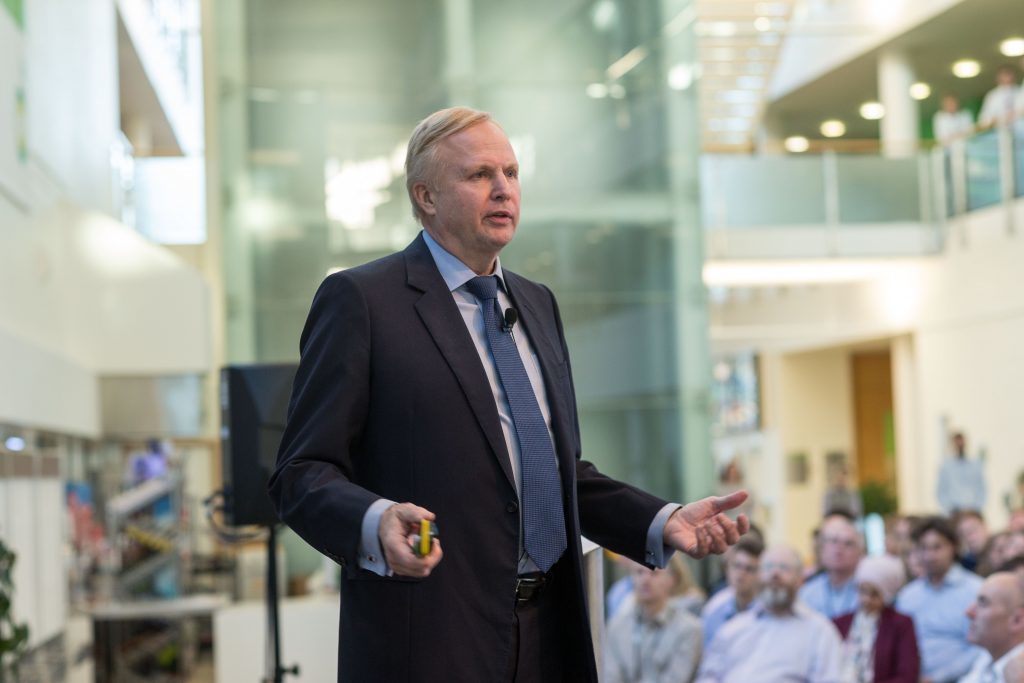
Bob Dudley signed up to big oil for one “simple” reason.
“It’s really simple,” he said.
“I just wanted to see the world. I was an engineer and I thought oil and gas was the most global industry I could be in.
“That was when it wasn’t very popular back in 1979. When I went to work I remember it was during the time when oil prices had suddenly shot up and I had friends who wouldn’t speak to me for joining the oil and gas industry.
“The first day I went to work there were demonstrations outside the building with signs that said ‘Stop Big Oil’ and I thought to myself, what I have I gotten myself into? But it has been great.”
He spent the first five years with Amoco in domestic engineering before he got his first international posting.
“They came and asked me if I could go to Gabon and I said, ‘sure that would be great’. I went home and talked to my wife about it, because she had a career too and we had to juggle all of this stuff,” he said.
“And then about a week later, as oil companies do, they said, ‘that’s off; we would like to move you to Great Yarmouth in the UK’, and I said, ‘okay, that’s great’. And then about a week later they said, ‘no, it’s Aberdeen’.
“And I thought this was the most exciting place to come to in the world in the oil and gas business, because Aberdeen is the real heartland of offshore engineering. We came here and I loved it. I had never seen anything like it before. The US Gulf of Mexico was nowhere near as advanced as Aberdeen.”
His family soon joined him.
“The guy who ran the office at the time did something that would be completely illegal today,” he said.
“He called everybody in and said, ‘I’m tired of sorting out Christmas and Hogmanay. No one can have any time off between December 15 and January 15,’ and walked out of the room.”
But they soon fell in the love with the area.
“My wife and I, when we’re asked which is the place you enjoyed most, Aberdeen just comes right out,” Mr Dudley said.
“We loved it there. Our son was born there. We were there at its peak and through the downturn, so we saw both sides of Aberdeen.”
At the time of the interview the seasoned chief executive is working on a 24-hour turnaround. In the past three weeks, he has jetted to six different countries, including Russia twice.
“You’re never on one time zone, but I still love the job and the industry,” he said.
The one trap he has tried to avoid is filling up his calendar with industry appearances.
“I can’t be out doing all of that,” he said.
“I have to spend time with the management team. We meet frequently. You have to stay close to things, because CEOs can start travelling so much and doing so many industry conferences that that is all they do. That’s not what I’m going to do.”
Still he insists there’s no one-size-fits-all formula for leadership.
“Today’s world goes so fast you just have to sort it out for yourself. There’s no formula around it. The leaders I respected the most were the ones who really listened first before asking questions.”
He added: “I try not to micromanage, but I’m really interested in the details, otherwise I don’t feel like I have a feel for what is happening.
“You also have to have people around you who actually tell you what is going on. In any organisation, the bad news has to travel as fast as the good news, otherwise as a leader you’re off balance.”
After seven years at the top, Mr Dudley, who will turn 62 later this month, has no plans to slow down.
He said: “People in London keep asking me this and I’ve decided that it’s part of the British tradition that CEOs retire at 60. I come from a culture where people retire at 65 or later, so I haven’t had this magic idea in my mind about 60.”
Mr Dudley sums his near-40 years in the industry in one succinct sentence: “It’s been a grand adventure.”
Recommended for you
